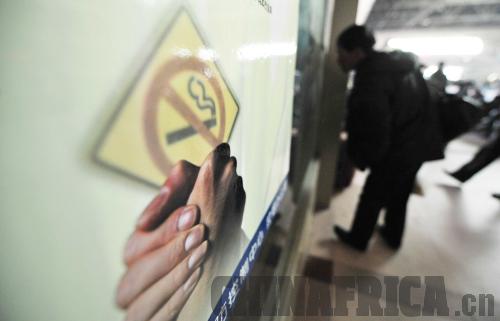|
 |
|
Smoking is banned in Harbin Railway Station WANG JIANWEI |
Packaging flaw
"Given the large tobacco consumption and smoking population, it will be a long time before China can achieve its tobacco control goal," Xu Guihua, Executive Deputy Director of Chinese Association of Tobacco Control, told ChinAfrica.
According to Xu, China still lacks sufficient efforts to publicize the harm of tobacco to people's health. For example, there are no effective warning signs on the cigarette cases in China.
"Cigarette packs are the best place to get people to give up smoking. But in China, they play the role of attracting more smokers," said Xu. Because of the attractive packaging, cigarettes are often used as high-end gifts in China during holidays and festivals.
More importantly, China does not have national regulations and laws to ban smoking in public places. There are 17 countries worldwide that have national laws to ban smoking and more than 150 others have laws to ban smoking in selected public places. In China, even the Advertising Law and the National Provisional Regulations on Tobacco Advertising Management do not forbid tobacco advertising.
"Without a [tobacco] law, it is very difficult for China to control tobacco in public places," said Xu.
Society the loser
China sits with a massive conundrum. On the one hand, tobacco should be banned, while on the other hand, the tobacco industry is a major contributor to China's tax revenue. At a national tobacco work conference held on January 11, Jiang Chengkang, Chief Administrator of State Tobacco Monopoly Administration, said that the tobacco industry contributed a total of 752.96 billion yuan ($119.52 billion) of tax and profits in 2011, a year-on-year increase of 22.5 percent.
But Xu doesn't think the tobacco industry can benefit society. On the contrary, it can only bring losses. According to the Fourth National Public Health Service Survey and the Health Statistic Yearbook in 2008, the direct economic losses from medical treatment of cancer, cardiovascular diseases and respiratory diseases caused by adults above 35 years old smoking that year reached 39.08 billion yuan ($6.2 billion); the indirect economic losses were higher, reaching 184.64 billion yuan ($29.3 billion).
"While earning profits for themselves, the tobacco enterprises are bringing greater losses to all aspects of our society," said Xu.
Conflict of interests
According to Xu, China has nearly 900 million people threatened by tobacco and joint effort by various government departments is needed to protect them. However, experts say that the government's efforts in this regard is ineffective.
After signing the Framework Convention on Tobacco Control in 2003, China established a mechanism headed by the National Development and Reform Commission (NDRC) to enforce the Convention. Five years later, the Ministry of Industry and Information Technology (MIIT) replaced NDRC to lead the mechanism that is expected to control tobacco in China.
"So far, they have hardly held any conferences, have no plans of controlling tobacco and have no legislation plan in this regard," said Xu.
Ironically, as a competent administration department, MIIT is in charge of development of the tobacco industry; as leader of this mechanism, it should ban tobacco. "Then, what should it do with the tobacco industry?" asked Xu.
In addition, the government supervision department State Tobacco Monopoly Administration and the tobacco operation enterprise China National Tobacco Corp. are actually one organization, operated by the same group of people.
According to Xu, the government department of tobacco is actually speaking for the interests of tobacco enterprises. They are expected to restrain the growth of the tobacco industry, but they are actually helping it seek larger development space.
"This is the greatest difficulty in tobacco control. Without reforming such a system, it's impossible for China to make any achievements in tobacco control," said Xu.
The good news is the Chinese Government has listed the goal of banning smoke in public places into its 12th Five-Year Plan (2011-15). "This is a very important move and we applaud it," said Xu. "But we also hope the government could take concrete measures to control tobacco." |